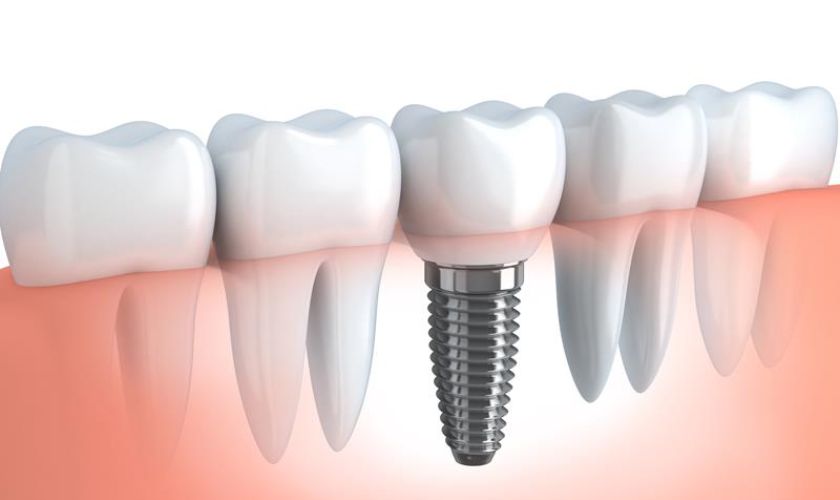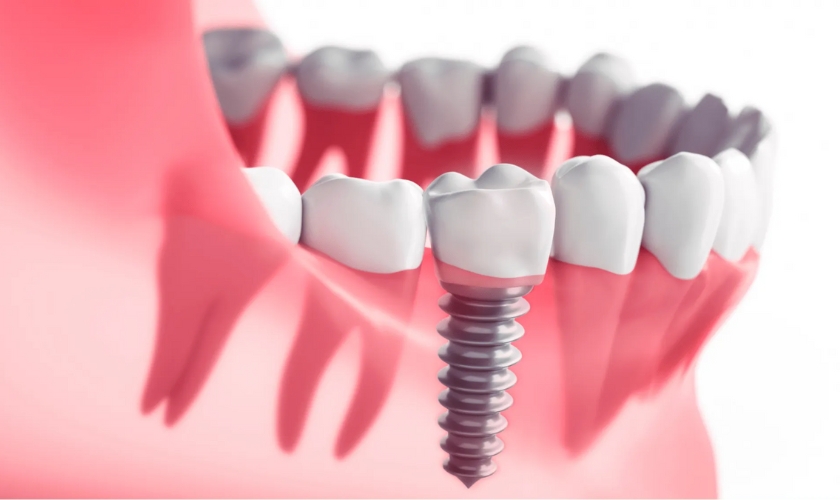New Patients Welcome!

Have you ever wondered what happens when a dental implant fails? It’s not something anyone wants to think about, but sometimes, despite the best efforts of both the patient and the dentist, implants can fail. Whether it’s due to poor healing, infection, or other factors, a failed implant can be both frustrating and disheartening. But fear not! In this blog post, we will explore how dentists fix a failed implant and what steps are involved in getting your smile back on track. So grab your toothbrush, and let’s dive into the world of dental implants!
Common Causes Of A Failed Implant
When it comes to dental implants, they are generally considered a reliable and long-lasting solution for missing teeth. However, just like any medical procedure, there can be instances where an implant fails to integrate properly with the jawbone or experiences complications later on. Understanding the common causes of a failed implant can help you take necessary precautions and make informed decisions.
1. Insufficient bone density: One of the primary reasons why an implant may fail is inadequate bone density in the jaw. Without enough healthy bone tissue to support the implant, it may not fuse securely and could eventually loosen or become unstable.
2. Infection: Infection around the implant site is another common cause of failure. Poor oral hygiene practices or pre-existing gum disease can increase the risk of infection during and after the implant placement procedure.
3. Failed integration: The process known as osseointegration involves fusing the titanium post of the implant with natural bone tissue. If this integration does not occur successfully, it can lead to instability or even complete failure of the implant.
4. Overloading: Placing excessive pressure on an implant too soon after placement can hinder proper healing and integration, leading to potential failure down the line.
5. Smoking: Tobacco use has been linked to higher rates of dental implant failure due to its negative impact on blood flow and wound healing capabilities.
6. Systemic diseases: Certain systemic conditions, such as diabetes or autoimmune disorders, can affect oral health and impede successful osseointegration.
It’s important to note that while these causes increase the likelihood of a failed dental implant, they do not guarantee it will happen in every case.
What To Expect During The Procedure
During a dental implant procedure, there are several steps that you can expect. First, your dentist will thoroughly examine your mouth and take X-rays to determine the best placement for the implant. This is important because it ensures that the implant will be securely anchored in your jawbone.
Once the treatment plan has been established, your dentist will numb the area with local anesthesia to ensure a comfortable experience. They may also offer sedation options if you’re feeling anxious or have any concerns.
Next, your dentist will make an incision in the gum tissue to expose the underlying bone. They will then create a small hole in the bone using special drills. This is where they will place the titanium implant post.
After carefully inserting the implant into place, your dentist will close up the incision with sutures and provide instructions for aftercare during recovery. It’s common to experience some swelling and discomfort following surgery, but this can usually be managed with over-the-counter pain medication prescribed by your dentist.
Over time, as you heal from surgery, osseointegration takes place—the process where surrounding bone fuses with the titanium implant post—creating a strong foundation for a replacement tooth or teeth.
Keep in mind that each individual’s healing process may vary slightly. Your dentist will provide specific guidelines on how long it takes before moving forward with placing an abutment and crown on top of the implant post.
Remember to follow all post-operative instructions provided by your dentist to promote successful healing and maximize the long-term success of your dental implants!
The Importance Of Choosing An Experienced Dentist
When it comes to fixing a failed dental implant, one of the most important factors to consider is choosing an experienced dentist. Why is this so crucial? Let’s delve into the reasons.
First and foremost, an experienced dentist has a wealth of knowledge and expertise in handling implant-related issues. They have likely encountered various complications and know how to address them effectively. From identifying the root cause of the failure to devising a customized treatment plan, their experience plays a significant role in ensuring successful outcomes.
Additionally, an experienced dentist stays updated with the latest advancements in implant dentistry. They are familiar with cutting-edge techniques and use state-of-the-art equipment during procedures. This ensures that you receive top-notch care using modern tools that enhance precision and accuracy.
Moreover, choosing an experienced dentist instills confidence and peace of mind. You can trust their judgment and feel assured that they will provide optimal solutions for your specific case. Their expertise not only helps fix a failed implant but also minimizes risks associated with further complications or failures down the line.
An experienced dentist often has a proven track record of successful cases under their belt. You can ask for references or read patient testimonials to gauge their proficiency in handling complex situations like yours.
In conclusion (as per instructions), selecting an experienced dentist is vital when dealing with a failed dental implant as it ensures superior knowledge, access to advanced technology, assurance of quality care, and increased chances for positive outcomes.
Aftercare And Recovery
Aftercare and recovery are crucial aspects of the dental implant process. Once the procedure is complete, it’s important to take proper care of your new implant to ensure its longevity and success.
Immediately after the surgery, you may experience some discomfort and swelling. This is normal and can be managed with pain medication prescribed by your dentist. Applying ice packs to the affected area can also help reduce swelling.
During the initial healing period, which usually lasts a few weeks, it’s important to follow any post-operative instructions provided by your dentist. This may include avoiding hard or chewy foods, practicing good oral hygiene habits, and attending follow-up appointments for monitoring.
As you continue to heal, you will gradually transition back into your regular oral health routine. It’s essential to maintain good oral hygiene by brushing twice a day and flossing regularly around the implant site.
Recovery times vary depending on individual factors such as overall health and bone quality. Your dentist will monitor your progress closely during follow-up visits to ensure proper healing.
Remember that patience is key during this phase. Give yourself time to heal fully before resuming strenuous activities or eating challenging foods that could potentially disrupt the healing process.
By following these aftercare guidelines and allowing yourself adequate recovery time, you give your dental implant the best chance at success in providing long-lasting smiles!
Alternative Options For A Failed Implant
- Dental implants are generally considered a highly successful and long-lasting solution for replacing missing teeth. However, in some cases, an implant may fail to integrate properly with the jawbone or develop complications over time. If you find yourself facing a failed implant, do not despair! There are alternative options available to help restore your smile and oral health.
- One possible alternative option is a dental bridge. This involves using adjacent healthy teeth as anchors to support a prosthetic tooth that fills the gap left by the failed implant. While this can be an effective solution, it does require altering the neighboring teeth.
- Another alternative option is dentures. Dentures are removable appliances that replace multiple missing teeth or even entire arches of teeth. They can provide functional and aesthetic benefits but may require periodic adjustments for proper fit and comfort.
- If you still desire an implant but have experienced failure with your previous attempt, there may be options for bone grafting or sinus lift procedures to improve bone density and create optimal conditions for successful implant placement.
- It’s important to consult with an experienced dentist who specializes in restorative dentistry to determine which alternative option is best suited for your specific situation. They will consider factors such as overall oral health, bone density, budget constraints, and personal preferences when creating a treatment plan tailored just for you.
- Remember that every case is unique, and what works well for one person may not be suitable for another. So don’t lose hope if you have encountered a failed implant – there are always alternatives available that can help restore your beautiful smile!
When a dental implant fails, it can be a disappointing setback for both the patient and the dentist. However, with the advances in modern dentistry, there are options available to fix a failed implant and restore your smile.
It is important to remember that prevention is key when it comes to avoiding implant failure. Choosing an experienced and skilled dentist who specializes in dental implants can significantly reduce the risk of complications during and after the procedure.
If you find yourself facing a failed implant, don’t panic. Your dentist will carefully assess the situation and develop a personalized treatment plan to address the issue. This may involve removing any damaged or infected tissue around the implant site and replacing it with new bone grafts or performing corrective surgery if necessary.
Aftercare plays a vital role in ensuring successful healing and long-term stability of your implants. It is crucial to follow your dentist’s instructions regarding oral hygiene practices, diet restrictions, medications, and regular check-ups.
In some cases where fixing a failed implant is not possible or not recommended due to certain circumstances such as poor bone density or infection risks, alternative options may be considered. These could include removable dentures or fixed bridges supported by natural teeth or implants on either side of the gap.
Remember that every case is unique, so it’s essential to consult with your dentist about which option is best suited for you based on your individual needs and preferences.
While dealing with a failed dental implant can be discouraging, seeking professional guidance from an experienced dentist ensures that you receive appropriate care tailored specifically for your situation. With their expertise combined with advanced techniques in restorative dentistry, they can help you regain confidence in your smile once again.
So if you’re experiencing issues with your dental implants, take action promptly. Schedule an appointment with your trusted dentist today – they are dedicated to providing effective solutions that will get you back on track towards achieving optimal oral health.





